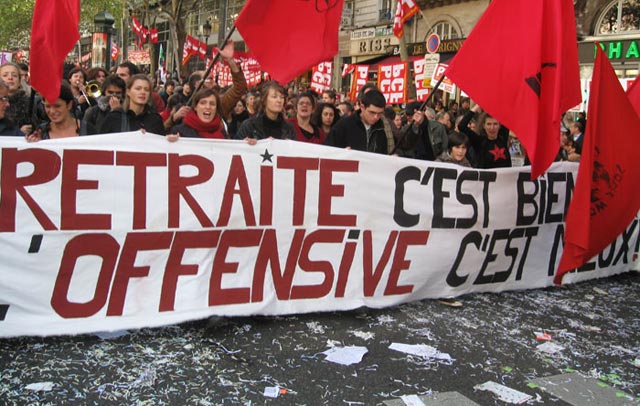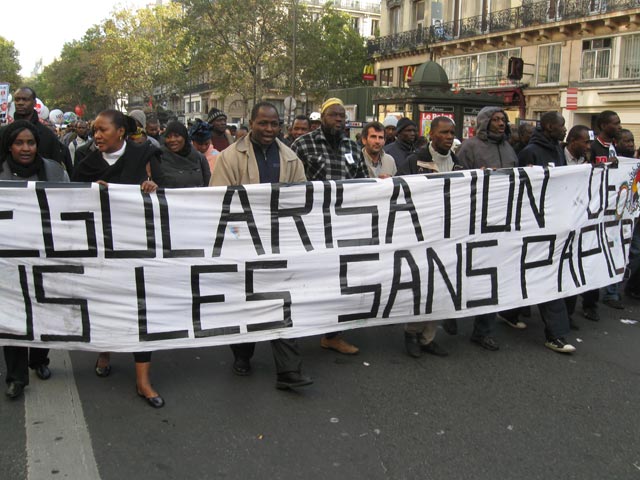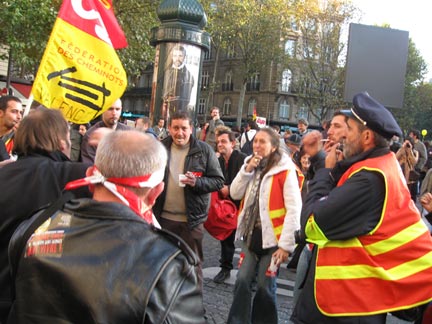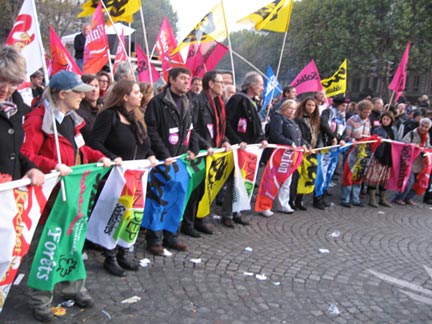
October 2010
2 Million in the Streets Against Sarkozy Attack

Demonstrators in the day of action against Sarkozy’s pension "reform" law, Paris, October 28.
(Internationalist photo)
PARIS, October 29 – For the seventh time in the last two months, millions of French working people took to the street yesterday in a day of workers’ strikes and mobilizations against the “reform” of pensions and retirement rights by the right-wing government of Nicolas Sarkozy. The marches were large, and if (predictably) smaller than the last several mobilizations, they were also noticeably more combative. There was lots of energy and fighting spirit. People came out because they wanted to say that the battle continues. At the end of the march and afterwards, the verdict was, “This shows that it isn’t over” – c’est pas fini !
Today’s newspapers reflected their respective editorial lines. The right-wing Figaro headlined, “Unions Checkmated.” The slightly more “centrist” Le Parisien and Le Monde, both of which oppose the struggle against the pension law, said the mobilizations were “marking time.” Libération, historically close to the Socialist Party (PS) which has equivocally supported the protests, headlined “The Surprises of a Conflict,” the surprise being that “new forms of spontaneous solidarity struggle” are supposedly replacing strikes. And L’Humanité, once the paper of the French Communist Party (PCF), proclaimed, “So Much Pent-Up Anger.”
Crowd estimates are a big deal in France, particularly as they influence the political maneuvering. The police, on behalf of the government, routinely report absurdly small crowd sizes, sometimes (notably in Marseille) as little one-tenth of the numbers provided by march organizers. The unions are reporting 170,000 demonstrators in Paris yesterday and around 2 million in 269 marches around the country, whereas the police are saying 560,000 nationally and 31,000 in Paris, which is ludicrous. The head of the march reached the end point, Saint-Augustin, after slowly walking 3-1/2 km, two hours before the end of the march even left the starting point at République.
Union leaders said beforehand that they weren’t looking to set any records on October 28, coming in the middle of the two-week Toussaint (All Saints Day) vacation when schools close and a lot of families leave town. The law was approved Wednesday (October 27) by a two-to-one margin on a straight party-line vote of the “presidential majority” versus the “left” opposition. Prime Minister François Fillon declared that there was no sense demonstrating any more. It didn’t stop millions of people from coming out to express their opposition. In terms of sheer numbers, the mobilization was a relative success, as large as any of the demonstrations in 1995 (when there were huge mobilizations against a law to “reform” public workers’ pensions). Politically, however, the strike movement is stymied by its leaders who want desperately to get out of a sticky situation. And there is no significant class-struggle opposition prepared to fight them.
What stood out was how energetic the crowd was. Lots of contingents singing, chanting constantly, jumping up and down, doing dance steps – not rows of marchers proceeding down the street in lock-step. At an “Interprofessionelle” meeting of militants from different unions and workplaces afterwards, there was some discussion evaluating the day’s events. While the union tops had made it clear that they were looking for the exit, the spirit of the march was that people were refusing to let it die.
On Monday, François Chérèque, head of the CFDT union federation (close to the SP) called on the government to negotiate about jobs for youth and seniors, saying now that the law had been voted things had changed. This was universally understood as an announcement that the CFDT would pull out. Government ministers greeted his remarks. On Wednesday, Bernard Thibault of the CGT (once controlled by the Communist Party, now not so much, although many in the ranks are still PCF supporters) said that the movement was continuing for now, until the law is officially promulgated (probably around November 15). So at bottom both CFDT and CGT leaders are saying once it’s official, they will stop the protests – they just have different dates when they say that was or will be.
Yet although the CFDT tops want to get out, there the union was with a significant contingent yesterday, and they say it will come out again on November 6 (the eight day of action since the beginning of September).
Overwhelming popular opposition to the pension “reform” has forced the union tops to continue. It’s not hard to figure out why. If they drop the struggle it will mean most people will have to wait until 67 to retire, whereas now the average age for going on pension is just over 60. (This is often proceeded by a couple of years on unemployment insurance, as French employers regularly fire workers in their late ’50s in order to make way for younger workers.) In addition to postponing the age for retirement, the minimum number of years of contributing to the state pension fund has been progressively raised from 37.5 to 41.5. (In contrast, in a number of unionized jobs in the U.S. – ones that still have pensions – workers can retire with 25 years of service after reaching a certain age.)
Basically this law means that in manual labor jobs, many workers will not be eligible for retirement until pretty close to when they drop dead. And people know it. And given the practice of firing older workers, and the current high unemployment due to the capitalist economic crisis, it is quite possible that a result of the law will be older workers forced into precarious conditions of unemployment for an extended period. Moreover, students in professions requiring extensive university education will have to be close to 70 before they are eligible for retirement. And the same goes for young workers who start out in apprenticeships, internships, part-time and temp jobs and short-term contracts, none of which count toward retirement.
French Protests, Cuban Rum

Contingent
of undocumented immigrant workers (sans papiers) march in October 28
Paris demo.
Trotskyists fight for full citizenship rights for all immigrants.
(Internationalist photo)
At the starting point at 1 p.m., there were thousands of people in and on all sides of République square in Paris. The UNSA (autonomous unions) soundtruck was playing “Temps des Cerises” (roughly, It’s Cherry Blossom Time), a song connected with the Paris Commune. Not exactly rousing, but haunting. A dozen or more union trucks were serving food and drinks off the tailgate. This is France: you can get a Kronenbourg or Heinekens beer or a glass of red wine at the demo for 2 euros. But the big thing in the CGT trucks was Cuban mojitos, also at €2 each, with real Havana Club rum.
The demonstration was overwhelmingly workers. Although there were plenty of unattached individuals walking in the crowd, for the most part participants were organized in contingents. CGT 93 (Seine-St Denis), CGT 94, CGT 92, CGT air transport, CGT education, CGT health, CGT Territoriaux (local government), CGT you name it; CFDT truckers, CFDT airlines, CFDT chemical, CFDT health; SUD Rail, SUD Education, SUD Students, and so on. But also CGT Prefecture of Police, as if the cops – these professional strikebreakers and oppressors, the armed fist of the bourgeoisie and backbone of the capitalist state – were part of the working class!
French companies may have shut down large numbers of plants to lower wage costs by moving production off-shore, but the working class is still here. Lots hard hats with multiple union stickers plastered all over their jackets, lots of women workers in the front rows of the contingents, even quite a few proper-looking middle-aged middle-class men and women blowing whistles and chanting slogans. Not much of an age gap: plenty of workers in their ’50s and ’60s, but also in the ’40s, ´30s and ’20s. There were a significant number of students, but no more than 10 percent, and a contingent of several hundred black African undocumented immigrants (sans papiers). But few or no signs calling for opposition to Sarkozy’s racist mass deportation of Romany peoples and French gens de voyage (travelers, referred to in the press as gypsies).
Nor did we see any signs against French
troops in
Afghanistan. French leaders may have criticized the U.S. war on Iraq
(although this hasn’t stopped he French oil company Total has
from putting in its bid to develop two of Iraq’s
major oil fields). But in Afghanistan French troops have been
part of the U.S.-led NATO force occupying the country since 2001.
Trotskyists
call to drive French imperialism out of Afghanistan, as well as out of
the
former French colonies in Africa (a neo-colonial empire that has been
dubbed Françafrique) where they regularly prop
up puppet dictators, no
matter whether right-wing or “left-wing” governments are in office in
Paris.
During the recent protests a conference was held at the Paris X
University in Nanterre
on 50 years of supposed independence in Africa. Sarkozy’s policy is a program of defense of French
imperialist interests down the line, from smashing workers’
pensions to mass deportation of Roms to violence against youth of
immigrant origins to military action in Africa and Afghanistan. But
this was
not reflected in the mobilizations, not even from “far
left” groups that on paper are for withdrawal of
French troops from Afghanistan. Here, following the reformist logic of
sectoralism, they are only criticizing the government’s economic policies.
There were only a couple of rag-tag Socialist Party (PS) banners and a nearly invisible stand. In the previous march the PS had a substantial contingent, so with their absence they were making a statement that for them, la guerre est finie (the war’s over), and they have now pulled out of the protests. The PCF handed out free copies of L’Humanité and lots of stickers. There were some dozens from the Left Party (Parti de Gauche) which is allied with the PCF in the Left Front, a proto-popular front that is angling for an alliance with the very bourgeois Greens. Just ahead of them was a substantial stand for the anarcho-syndicalist CNT (National Confederation of Labor) chanting for a general strike.
 CGT rail workers chanting and blowing
whistles at the end of the October 28 march in Paris. (Internationalist photo)
CGT rail workers chanting and blowing
whistles at the end of the October 28 march in Paris. (Internationalist photo)
The Solidaires union contingent (SUD-Rail, SUD-Health, SUD-Education, etc.) was several hundred, not that large but quite working class. These are the “far left” unions associated with the New Anti-Capitalist Party (NPA), the former Ligue Communiste Révolutionnaire decked out in openly reformist clothes. When the SUD unions came to the end point they were chanting Tous ensemble, tous ensemble, grève générale (All out together, general strike), as were the NPA marchers right after them. “Tous ensemble” was the emblematic slogan of the 1995 strikes. The NPA/SUD play around with the slogan of a general strike, but don’t really call for it, and certainly don’t prepare for one. Clearly their idea of a general strike is one called by the trade-union leaderships, and since the CGT and CFDT are not about to call it, it becomes abstract.
The NPA sold its paper Tous Est À Nous (Everything Belongs to Us) calling for an “anti-capitalist alternative.” But its main piece of propaganda was a sticker with pictures of President Sarkozy and Prime Minister Fillon saying, “They should go, because they’re worthless.” In other words, calling to channel the protests into the 2012 elections. Yet on the street, among their ranks, the slogan of a general strike was very popular. (The UNSA also chanted for a general strike.)
Lutte Ouvrière brought up the rear after Force Ouvrière. Lately, F.O. has been doing a number of actions together with SUD. In June, F.O. leader Jean-Claude Mailly called for a general strike, but this grandstand play was a flop, so now they are very gingerly about doing anything about it, while verbally striking a militant posture. Mailly is close to the followers of the late Pierre Lambert of the PT (Workers Party), now become the POI (Independent Workers Party), and there are quite a few Lambertists among the F.O. cadres.
At the destination point, two groups of workers hung out together: railway workers and refinery workers. These are the two sectors that have actually struck in recent weeks, rather than just marching. In an interview, a rail worker from the Gare de Lyon, expressed some resentment that they were pretty much alone. We went out, he said, but nobody followed. A general strike? Yes, but who is going to kick it off? He said they had voted to cut their strike back to daily 59-minute work stoppages.
The Question of Leadership
The movement has been mostly marches, but what really shook the bourgeoisie up was the strikes in the last two weeks. The bureaucrats claim most workers are not ready to strike, but if so, why have refinery workers, who have never before been in the forefront of struggle, held out for two weeks? Moreover, every day there are scores of actions that are clearly local initiatives. Many of these actions involving militants from different unions are called in order to effectively block the end of a strike. So the reason other sectors didn’t strike is not because of reluctance among the ranks, but mainly because the labor bureaucracy refused to call them out..
 Contingent
of the Solidaires union federation. “Far leftists” become trade-union
reformists offer no opposition to the CGT, CFDT tops. They are all part
of the pro-capitalist labor bureaucracy. (Internationalist
photo)
Contingent
of the Solidaires union federation. “Far leftists” become trade-union
reformists offer no opposition to the CGT, CFDT tops. They are all part
of the pro-capitalist labor bureaucracy. (Internationalist
photo)
Toward the end a sound truck played Motivés, the theme song of the 1995 strike, at a point in the march where most demonstrators were more fatigué. There were some of the red flares common in French workers’ demos, which make for a good show. In terms of its spirit, it was quite a difference from the lackluster AFL-CIO march in Washington to pressure Obama on October 2, which thousands of workers left almost immediately. Marchers in Paris and around France were there to make a point that they were not discouraged and were prepared to keep on protesting. A favorite slogan was, “They passed the law, but we’re continuing” to fight (Ils ont vote la loi, nous, on continuera). But there is no substantial challenge to the pro-capitalist union leadership.
Certainly not from the major organizations of the French “far left” whose politics are only marginally to the left of the Thibaults, Chérèques and Maillys, if at all, and who mainly serve as a shield blocking the emergence of a genuinely revolutionary opposition. With their various brands of “anti-capitalist” rhetoric, simple trade-unionism and outright populism, they will at best be a left flank of a new popular front as it coalesces around election time. For now, they are just continuing to march. But soon matters will come to a head, when the bourgeoisie cracks the whip and the union tops move to shut down the protests. Then the labor bureaucracy will pay no more attention to the ranks’ willingness to fight than Sarkozy pays to their marches. They will heed their masters’ voice in defending the paramount interests of French capital.
Unless, that is, they are frontally challenged. Workers, students, youth, immigrants want to fight. But who will lead them, and on what program? Seventy years ago, Leon Trotsky noted of the trade unions that they “can no longer be reformist, because the objective conditions leave no room for any serious and lasting reforms. The trade unions of our time can either serve as secondary instruments of imperialist capitalism for the subordination and disciplining of workers and for obstructing the revolution, or, on the contrary, the trade unions can become the instruments of the revolutionary movement of the proletariat” (“Trade Unions in the Epoch of Imperialist Decay,” 1940). This is the dilemma facing French workers today and the challenge to would-be revolutionaries everywhere. ■
To contact the Internationalist Group and the League for the Fourth International, send e-mail to: internationalistgroup@msn.com